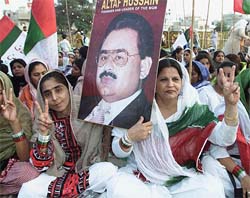
According to
Reuters Simon Cameron-Moore Musharraf is confident that the majority of judges would find in the government's favour.
“A source close to Musharraf described the decision to set up a full court as ‘the first good news for the government since March 9’”.
While I can no longer comment on the case, all I can say is that the pressures on the judges right now must be tremendous. It is perhaps time for us to reflect upon the oath they took upon taking their office:
That I will not allow my personal interest to influence my official conduct or my official decisions:
That I will preserve, protect and defend the Constitution of the Islamic Republic of Pakistan:
And that, in all circumstances, I will do right to all manner of people, according to law, without fear or favor, affection or ill-will.
May Allah Almighty help and guide me (A'meen.)
_______________________________________
Pakistan’s Musharraf girds for collision with judge
(Reuters)10 May 2007
ISLAMABAD - Despite public anger, media criticism and a virtually united judiciary’s opposition that have undercut his popularity and clout, President Pervez Musharraf looks bent on ousting Pakistan’s top judge through the courts.
Months away from elections, Musharraf badly damaged his standing by suspending Supreme Court Chief Justice Iftikhar Chaudhry on March 9, because of undisclosed charges of misconduct which people suspect are politically motivated.
‘He’s lost a lot of his authority,’ Najam Sethi, editor of the Daily Times, said. ‘He has to decide now how best to hold onto the authority he still has.’
Sethi believes the tide is carrying Musharraf toward a choice between either reaching a power-sharing deal with a civilian rival, such as self-exiled former prime minister Benazir Bhutto, or invoking authoritarian measures.
The trouble is, Bhutto will be shrinking away from a deal, and demand a higher price than she would have before Musharraf dug himself into a hole over the chief justice.
Ultimately, Musharraf might have to give up his post of army chief.
Political analysts are not alone in doubting whether US ally Musharraf can ever recover the influence he wielded over the volatile Muslim nation before the judge stood up to him.
‘He’s played his cards so badly. He could have turned the country around,’ lamented Parveen, a well-to-do, middle-aged Islamabad woman.
These days, she feels differently about the general she harboured such high hopes for when he came to power in a popular, bloodless coup in 1999, ending a decade of hapless civilian rule.
‘Oh for a Messiah,’ she sighed.
Here comes the judgeIn contrast, Chaudhry’s image has been burnished by media accounts of how he withstood pressure to resign from Musharraf and a handful of generals.
The independent-minded judge had already impressed people, if not the government and security agencies, by taking up awkward cases such as the whereabouts of missing detainees and a challenge to the sale of a state-owned steel maker.
Chaudhry, 58, has sought to maintain decorum, avoiding political statements while urging the legal community to uphold
independence of the judiciary and supremacy of the constitution.
While rowdy lawyers have belted out chants of ‘Go, Musharraf, go’, Chaudhry’s moustachioed, heavy-lidded face has been a study in deadpan.
The lawyers’ movement championing the chief justice will keep up the pressure. The bar in Karachi has invited Chaudhry to speak on Saturday, after which he is expected to go to Multan in the south of Punjab province.
But the partisanship Chaudhry has provoked will make it difficult for him to resume his post, as he will be vulnerable to accusations of bias.
Musharraf has vainly warned against politicising the case, as he enters a crucial period with plans to secure his re-election in September or October for five more years from sitting assemblies before they are dissolved for a general election.
He is also expected to try to retain his post of army chief, violating a commitment to give up the dual role this year.
Tipping point?Analysts suspect Musharraf wants a more pliable chief justice to deal with constitutional challenges opponents may mount.
‘The foremost objective on his agenda is his re-election in uniform by the present assemblies,’ said Ayaz Amir, a prominent columnist with Dawn newspaper. ‘With each passing day it is more and more unlikely that he will realise that objective.’
A tipping point could turn out to be the stunning display of public support Chaudhry received on a drive to Lahore from Islamabad last weekend to address the Punjab capital’s lawyers and judges, some analysts say.
Whatever Musharraf does, his next step in a crisis he brought on himself will be fraught with risk.
If he could not reach an acceptable political deal with ex-prime minister Bhutto and took the authoritarian route instead, Musharraf would alienate the public.
He would also make US allies think twice about whether he is a leader who can guide Pakistan to moderation and true democracy.
By all accounts Musharraf remains set against withdrawing the accusations against the chief justice, and seems confident the judges hearing the case will recommend Chaudhry’s removal.
On Monday, the Supreme Court ordered a stay on the inquiry by a five-judge Supreme Judicial Council.
It also ordered that 14 Supreme Court judges should open a hearing on Monday to decide whether the council was constitutionally mandated and free of bias.
A source close to Musharraf described the decision to set up a full court as ‘the first good news for the government since March 9’, and was optimistic the majority of judges would find in the government’s favour.
‘We are convinced that the full court and SJC will give a decision on merit and the president said he will accept the decision,’ the source said.
Daily Times editor Sethi saw compulsions other than the law.
‘It cannot be resolved legally because it has become a political crisis. The legal decision will be a political one.’
 Pakistan
Pakistan Supreme Court of Pakistan
Supreme Court of Pakistan


















